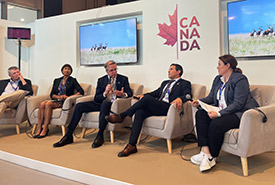Top 5 things I learned at COP28

Rob Wilson and other panelists at the Grasslands and Canadian Livestock: Solutions from the Ground Up event at COP28 (Photo by Melanie Bos/NCC)
As NCC’s director of conservation finance, I went to COP28 to learn how the world can fund climate change solutions, and to share about how we are building partnerships across the country to support nature and climate goals through nature-based solutions. Here’s some of what I heard:
🔑Nature offers key solutions
Never before has nature taken on a bigger role at a climate COP. The world now recognizes that investing in nature helps secure our future. Nature-based solutions (carbon storage, water management, etc.) have gone from “nice-to-haves" to “need-to-haves."
📈 Climate and nature disclosures are critical
COPs are about more than just binding government agreements. From securities commissions and standard bodies to shareholders and consumers, stakeholders are demanding that companies report on their nature and climate impacts. Companies need to think about how to account for nature and greenhouse gas emissions in their business plans, or risk being left behind. Many of these disclosures will likely become mandatory, underscoring the importance of getting on board.
🔍 New oversight bolsters carbon market
Carbon markets offer opportunities to finance conservation and support local economies. For them to truly make an impact on our climate, offsets and credits need to be rigorously verified and of high integrity. It was significant to see the world’s leading carbon standard bodies agree to work together on this. The Integrity Council for the Voluntary Carbon Market will now vet standard bodies, so investors can be assured that they are helping keep real carbon out of the atmosphere and protecting lands that support life.
🤝Climate solutions must be equitable
Decisions on climate change solutions must not occur without the participation of Indigenous Nations and communities, the Global South and other marginalized groups. Without their involvement, we have no chance of hitting our targets. We’ve arrived at this crisis point because some parts of the world have long profited by extracting and exploiting the resources of other countries. We owe these communities the support they need to grow sustainably.
💡Our innovation offers opportunity
COP28 showed me that Canada is a creative leader when it comes to finding solutions to climate change and nature loss. The Nature Conservancy of Canada (NCC) works with partners across all sectors to find new ways to conserve this country’s massive carbon sinks, in an effort to address climate change and protect biodiversity.
NCC’s own carbon projects are conservation-first, but also protect globally significant carbon stores. Our collaborative approach to protecting landscapes helps unlock new approaches to conservation. Our expertise helps develop new conservation tools and support Indigenous Nations and communities to create Indigenous Protected and Conserved Areas. As I showed at a COP28 panel discussion, we’re now doubling down to protect grasslands, by working alongside ranchers and livestock producers to create and implement the tools they need to steward these places for the good of the planet.
Protecting nature helps protect us all. We must continue to innovate and collaborate to pursue these solutions.


